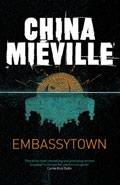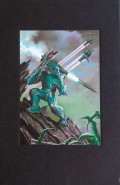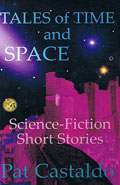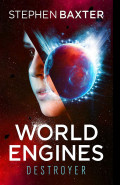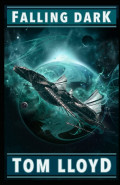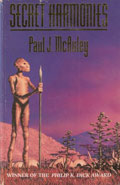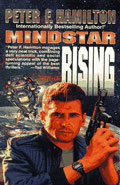Diaspora
By Greg Egan
Diaspora is a science fiction novel by the Australian author Greg Egan.
About a thousand years in our future an entity is born. Not of man and woman , but as an orphan of Konishi Polis. A Polis is a virtual reality society, where a group of computerbased intelligences are living. There are several Polis around the world, living side by side with the “Fleshers” (Homo Sapient descendants still in biological form) and the Gleisners (it's never made quite clear, but probably human brains in robot bodies). Well, not exactly side by side, but most of them in the same solar system and capable of communication when and if they want to.
But like I said: An entity is born – the first chapters tell the story of how a non-biological intelligence evolves and gains self awareness. The discovery of otherness, the first stumbling interactions with the external environment, gaining of self awareness – all really interesting stuff. What Egan is doing is giving us background for the rest of the story – most of the characters in this books are Polis citizens and it's important to understand the way they work psychologically as well as to understand how their environment work.
I'm aware of the fact that I say this every time I review a book by Egan, but that doesn't make it any less true: Egan constant amazes me and there can't be any doubt in my mind, currently, Egan is the best when it comes to hard science fiction. Nobody else comes close. Diaspora is split in to eight parts and each of them contains a new idea and a new direction for the story.
Each of these ideas would have been good enough to be the basis for its own books, but Egan manages to cram a handful of amazing ideas in to this one book. First Egan invents his new theories about the basic structures of our universe and then he reinvents them. Then he goes somewhere else. What makes a binary star system collapse six million years before the predicted time? Will we be able to travel by worm hole to other star systems? Where did the aliens go?
Egan manages to hold on to his characters and keep them alive in the middle of all these ideas, but he does loose touch with his ideas a couple of times. Or maybe it's just me – there are a couple of passages where universes with more dimensions than this one are discussed and ... I simply can't contain them in my brain. What mostly happens is that I get the idea that things are fairly complex, but that's it. I'm good at logic and abstract thinking, but this leaves me totally stumped. Anyway, it isn't that important – you'll be able to understand the story and enjoy the great ideas in the book even if you doesn't understand all of it. I know I did!
Review by bon
Oh what the hell have I gotten into..This book is a mathematician's wet dream with all of it's virtual worlds dipping and climbing themselves to act out formulas that exist in software space/programs.
There's the Polis citizens who are all software "beings" with he and her replaced with ve and ver. They are generated by the Polis mind seed, a sophisticated program set mainly in the solar system and originally under Siberia. When someone wants to create a new citizen, a couple?, they merge codes.
Ok then there's the orphans who are citizens made as explorers which the main characer is.
Then there's the Fleshers, people who didn't get downloaded into software and enjoy physical senses. You just need the intordus program and pop, youre a little ball full of the personality downloaded.
Then the Gleisner, androids with software heads who spend time going anywhere since time doesn't matter to them. One guy hangs out on the moon running programs. Others carve up a comet to keep it away from the earth.
Easy enough right? No. Not for me anyhew. The Glossary in the back kept me up with some of the things in here. I was still a fish getting flushed down a toilet with a manual on sewage repair system with an order to fix the planet.
Although this book was a task and a half I still enjoyed the read!!! This guy doesn't care if you are not following, someone like R. Sawyer would take time to turn around and say over the shoulder "hey buddy, you following me?", this guy Egan doesn't hold back. He assumes you are some kinda smartie pants like him..... Egan kept the brain at peaks like he's blowing up your head balloon ways and letting out a little air once in a while thru a nostril. You understand the neutron? It will help....
Sample paragraph: The macrosphere's four-dimensional standard fiber yielded a much smaller set of fundamental particles than the ordinary universe's six dimensional one. In place of six flavors of quarks and six flavors of leptons there was just one of each, plus their antiparticles. There were gluons, gravitons, and photons, but no W or Z bosons, since they mediated the process of quarks changing flavor. Three quarks or three antiquarks together formed a charged nucleon or antinucleon, similar to an ordinary proton or antiproton, and the sole lepton and its antiparticle were much like an electron and positron, but there was no combination of quarks analogous to a neutron.
Glob almighty get me some aspirin. The whole book isn't like that but the mighty brain Egan goes hither and thither into the wormholes of his own mind that I just need to take notes if I read this thing again. It's just plain nasty to the feeble minded types like me. It may be a while before I pick up another one of his books, this one is a killer.
Written on 8th October 2002 by TC .

